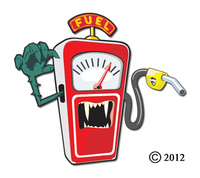Zero-Emission Vehicles Sales Not Reaching Necessary Volume To Allow Car Makers To Continue To Sell Gas Hogs in California
 OPEC's Best Friend, America's Worst Enemy |
EDITORS NOTE: If California and other well-meaning States mandated that high-test E85 replace regular E10 gasoline, all of this Zero Emission and MPG Bull crap would become meaningless.
Car Makers and buyers could make and buy what cars and trucks they want and need, so what's the problem? I believe that the move to raise MPG to meet CAFE standards by demanding the sale of unwanted and expensive Zero Emission vehicles is just another clever way to make sure that Americans continue to be held hostage by Big Oil. MPG is just a metaphor to keep America's motorists under the monopolistic thumb of the gasoline industry, their American claque and our traitorous bought and paid for politicians, educators and journalists.
When the majority of America's 250 million vehicles use historically cheaper, domestic, renewable and cleaner Ethanol (the 100 year old fuel that should once again be the fuel of choice) our economy will skyrocket and the rated MPG of a considered new vehicle will once again return to what it should be; a personal economic and practical decision not a national security issue.
.WASHINGTON - June 18, 2013: NACSDaily reported Bloomberg.com said that automakers are coming under “increasing pressure” to sell zero-emission vehicles to U.S. consumers who haven’t shown much interest in them, with nine states following California’s lead in setting sales targets.
California set a goal of having electric, plug-in hybrid and hydrogen-powered models reach 15% of its new car purchases by 2025. Automakers will face fines and potentially restrictions on sales for not reaching the targets, notes the news source, adding that nine states have adopted similar versions.
• SEE: Latest CARB Rules Screw Californians Yet Again
The problem, however, is that consumers just aren’t buying the cars. Honda’s plug-in electric Fit had total U.S. sales of 83 through May, according to Autodata Corp. Honda’s goal was to deliver 1,100 electric Fits over two years, but with a two-year supply sitting on dealer lots, it cut its lease rate this month by one-third ($259 a month).
At the end of May, there was a 162-day inventory of Chevy Volts, according to Ward’s Automotive Group, which is comparable to a 50-day inventory for the top-selling Toyota Camry.
“There are only a select number of income brackets that can afford them,” said Bailey Wood, legislative director of the National Automobile Dealers Association. “The Chevy Volt in terms of price tag is equivalent to a fairly equipped BMW 3 Series. At the end of the day, we are a consumer-driven economy, particularly in the auto industry.”
Requiring a set amount of plug-in vehicle sales is also an inherently risky strategy, Edward Cohen, Honda vice president for government and industry affairs, told the news source, adding that the mandate “directs manufacturers to offer consumers technology options along a pre-determined time frame and with specified numbers notwithstanding whether the technology and market are ready.”
About one-third of 1% of the 6.4 million new vehicles sold in the first five months of the year were zero-emission vehicles, according to the National Automobile Dealers Association. And with the government requiring automakers to boost the average fuel economy standards of vehicles to 54.5 miles per gallon by 2025, reaching that goal will require 1% to 3% of all vehicles sold to be electrics.
“An electric car is the lowest hanging fruit on the tree requiring the least amount of change from the consumer of anything we can do to reduce greenhouse gas emissions,” said Steve Crolius, transportation director for the Clinton Climate Initiative, at a Consumer Reports fuel-efficiency forum on June 13.
The Alliance of Automobile Manufacturers, a Washington-based trade group whose members include GM and Toyota, filed a petition with the U.S. Environmental Protection Agency to block California’s sales targets.
“The sales data tell the story of what consumers want,” said Gloria Bergquist, a spokeswoman for the Alliance. “The early adopters have purchased plug-in electric vehicles but mainstream consumers have not followed yet.”
• SEE ALSO: GUSHER OF LIES - Book Review and Reply to Author Robert Bryce's Anti-Ethanol Lies


